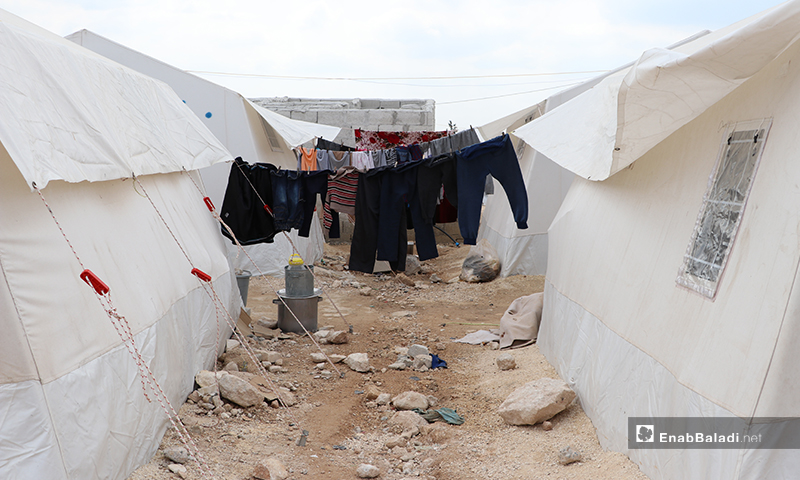



The displaced people of al-Azraq camp in the northern countryside of Aleppo suffer from the absence of basic services and vital infrastructures, such as shortages of water, and bread, compounded by the complete lack of access to healthcare services.
Many people of the al-Azraq camp in the opposition-held city of al-Bab spoke about a range of problems they encounter due to the lack of basic services in the camp in an interview with the program “what’s your problem?”—the program is broadcast on Enab Baladi’s social media platforms on Fridays and Mondays.
According to a survey conducted by the program, the residents of the camps were unanimous that the camp is mostly ill-equipped, as well as the essential services are almost non-existent. The residents suffer from severe shortages of medicines, water, and bread distributions.
The camp residents confirmed to Enab Baladi that in addition to the high price of bread, the quantities of bread are insufficient and very small, which forces them to eat dry bread.
The organization responsible for providing bread in the camp distributes tiny amounts of bread, allocating 450 bundles to 350 families.
Each family of ten members gets one bundle of bread, Yasser al-Darwish, director of Azraq camp, confirmed to Enab Baladi.
The whole residents of the camp agreed that water is scarce in the camp; people can only access to water for one hour in the morning and one more hour at night, which is not commensurate with the population density in the camp.
The camp is not provided with a sanitation system and lacks the minimum essentials of hygiene. The bathrooms, for instance, do have ceilings, and there are no washbasins, but only one faucet to wash hands, which mounts the fears about the rapid spread of the coronavirus (COVID-19).
Al-Darwish pointed out that only individual efforts contribute to delivering some limited services to the camp. A donor helped with digging a water well, yet, it does not meet the needs of a quarter of the camp’s residents.
He added, “we suffer from water shortages and its consequences—lack access to the bathrooms and cleaning—and we bring the water tanker trucks through personal efforts at the expense of certain individuals, because the camp is of self-management, we are not receiving funding.”
The cost of the water tanker truck amounts to about ten thousand Syrian pounds (SYP- 7.9 USD), some camp residents told Enab Baladi.
The displaced people of the camp complain that they face difficulty in receiving treatment for their health problems and about the high costs of medical services, if any, due to the lack of doctors.
In an interview with Enab Baladi, the pharmacist residing in the “Azraq” IDP camp, Zidan Zidan, said that the camp is “never equipped in terms of basic medical services, as there is no medical point, although it is essential for the presence of children.”
Zidan added, “we cannot provide some medicines for patients, especially for patients with chronic diseases and children, due to the worsening poverty and the vast distance from the serviced areas, in addition to the lack of productivity of pharmaceutical factories.”
The camp lacks life-saving medications and first-aid kits that are necessary for the residents of the camp, which is located in a wild area; they might be exposed to bites of scorpions or snakes at any time.
Zidan stressed that with the absence of water and medical personnel, the camp is particularly vulnerable to the spread of the coronavirus, and it will be “impossible” to control it.
In an interview with Enab Baladi, the Director of the relief office in the al-Bab local council, Ihab al-Rajeh, said that the al-Azraq camp was established by people outside of the local council.
Al-Rajeh added that “after setting up 100 tents, the mayor of the al-Azraq district told us that there are tents in the district established after the influx of displaced people from the province of Idlib triggered by military operations. Then, we headed to the camp and counted them.”
The relief office’s assistance was limited to providing bread to the displaced during the first days of their arrival, in addition to a food basket (77 kg) for each family about 20 days ago. After that, the director of the relief office promised a new batch of aid (detergents and clothes) for the camp in the coming days.
if you think the article contain wrong information or you have additional details Send Correction